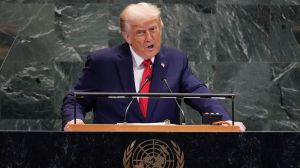Bush can hold military detainees indefinitely: court
Presdient George W Bush has the legal power to order the indefinite military detentions of civilians captured...

Presdient George W Bush has the legal power to order the indefinite military detentions of civilians captured in the United States, the federal appeals court in Richmond, Va., ruled on Tuesday in a fractured 5-4 decision.
But a second, overlapping 5-4 majority of the court, the 4th U.S. Circuit Court of Appeals ruled that Ali al-Marri, a citizen of Qatar now in military custody in Charleston, S.C., must be given an additional opportunity to challenge his detention in federal court there. An earlier court proceeding, in which the government had presented only a sworn statement from a defense intelligence official, was inadequate, the second majority ruled.
The decision was a victory for the Bush administration, which had maintained that a 2001 congressional authorization to use military force after the Sept. 11 attacks granted the president the power to detain people living in the United States.
The court effectively reversed a divided three-judge panel of its own members, which ruled last year that the government lacked the power to detain civilians legally in the United States as enemy combatants. That panel ordered the government either to charge Marri or to release him. The case is likely to reach the Supreme Court.
How helpful the decision will be to Marri remains to be seen, as the majority that granted him some relief was notably vague about what the new court proceeding should look like. In that respect, Tuesday’s decision resembled the June decision from the U.S. Supreme Court granting habeas corpus rights to prisoners held at Guantanamo Bay.
Marri is the only person on the U.S. mainland known to be held as an enemy combatant. The government contended, in a declaration from the defense intelligence official, Jeffrey N. Rapp, that Marri was an al-Qaida sleeper agent sent to the United States to commit mass murder and disrupt the banking system.
Brian Roehrkasse, a Justice Department spokesman, said the decision properly recognized “the president’s authority to capture and detain al-Qaida agents who, like the 9/11 hijackers, come to this country to commit or facilitate warlike acts against American civilians.”
Roehrkasse added that while the department believed that Marri “had already received all the process he was due,”its lawyers were”studying the court’s decision and will respond to Marri’s contentions” before the trial judge.
Jonathan L. Hafetz, a lawyer for Marri with the Brennan Center for Justice at New York University School of Law, called the 4th Circuit’s decision deeply disturbing.
“This decision means the president can pick up any person in the country — citizen or legal resident — and lock them up for years without the most basic safeguard in the Constitution, the right to a criminal trial,” Hafetz said.
The 216-page decision included seven opinions, none of which commanded a majority. The only common ground was four unsigned paragraphs at the beginning of the decision summarizing the result.
The 4th Circuit is generally considered the nation’s most conservative federal appeals court. The closely divided and complex decision in a major terrorism case therefore came as something of a surprise.
All of the judges who would have denied Marri any relief were appointed by Republican presidents; all who would have granted him full relief were appointed by Democrats.
Photos



- 01
- 02
- 03
- 04
- 05




























